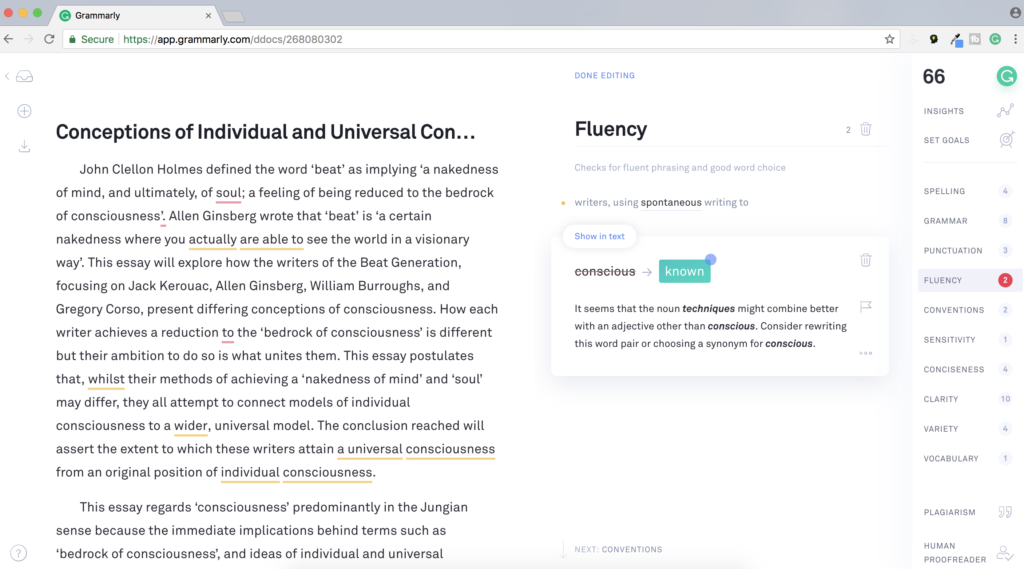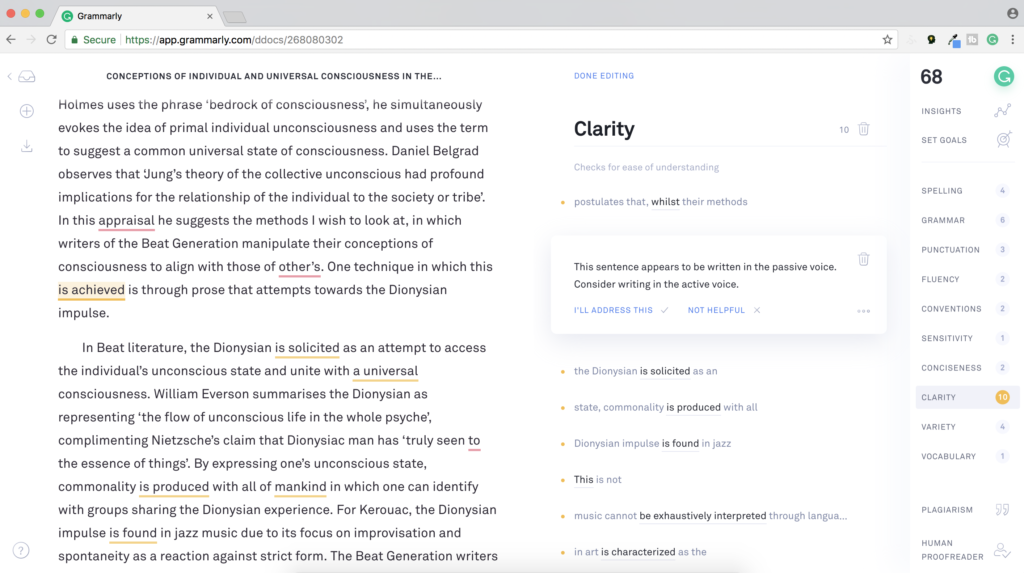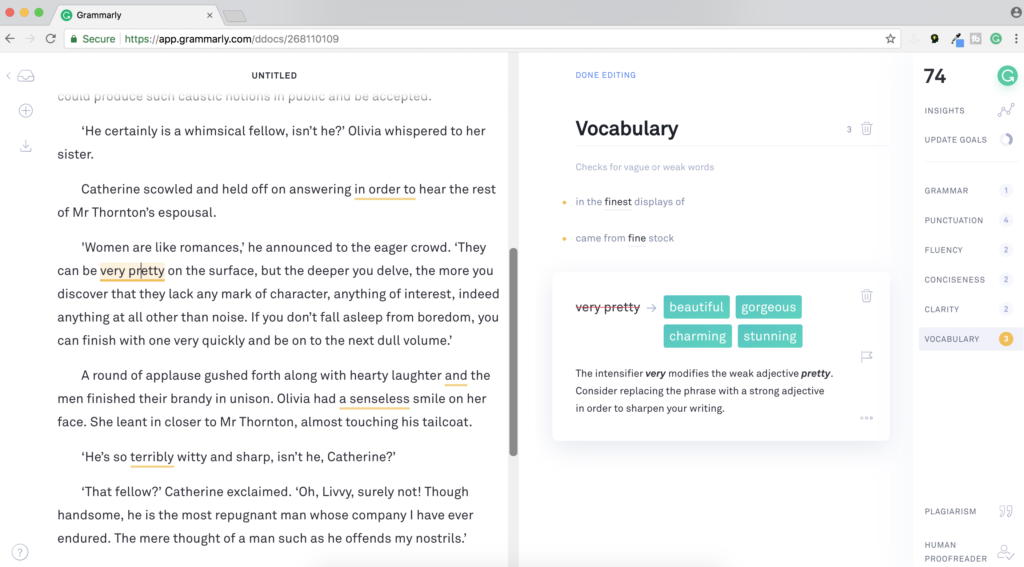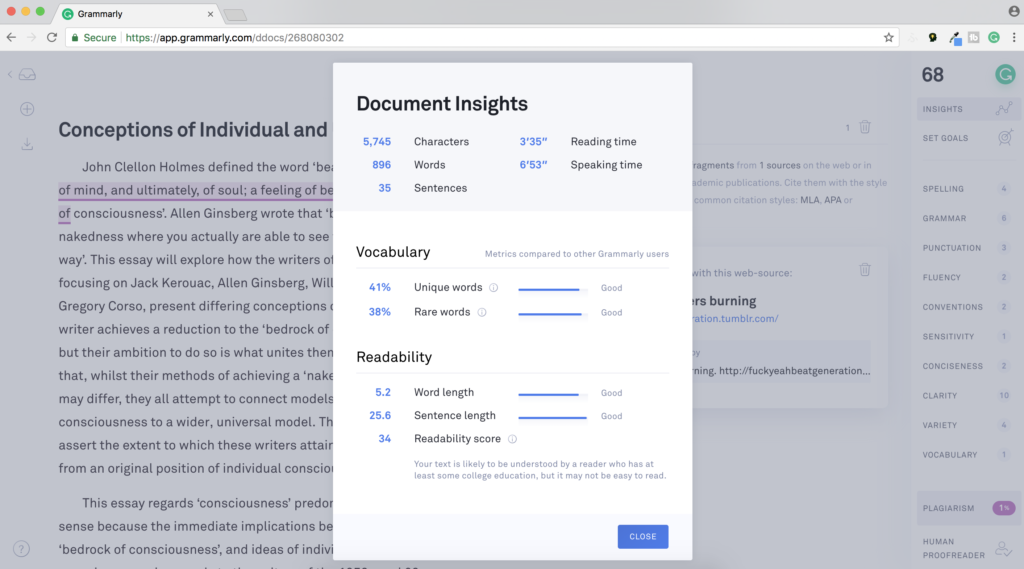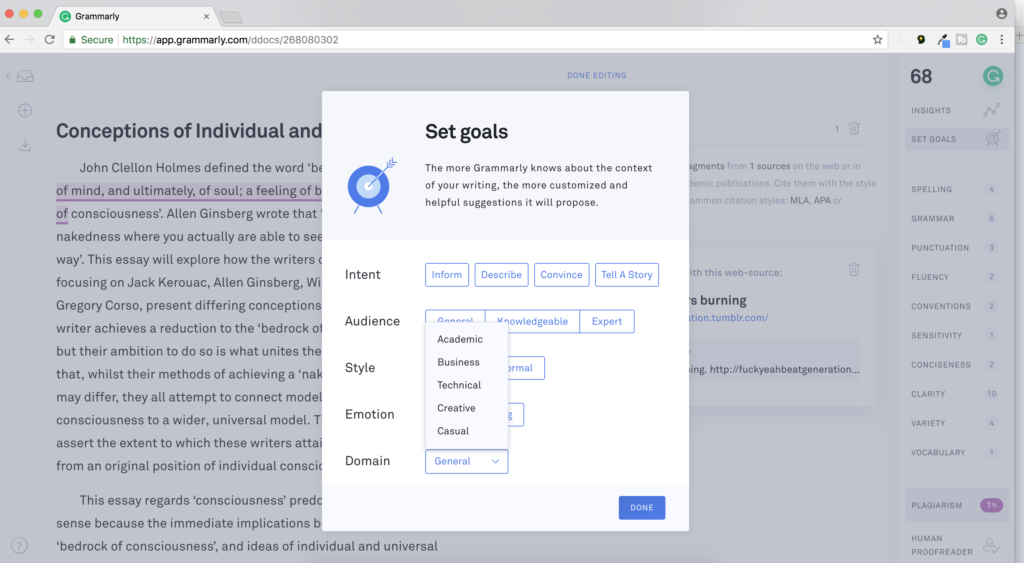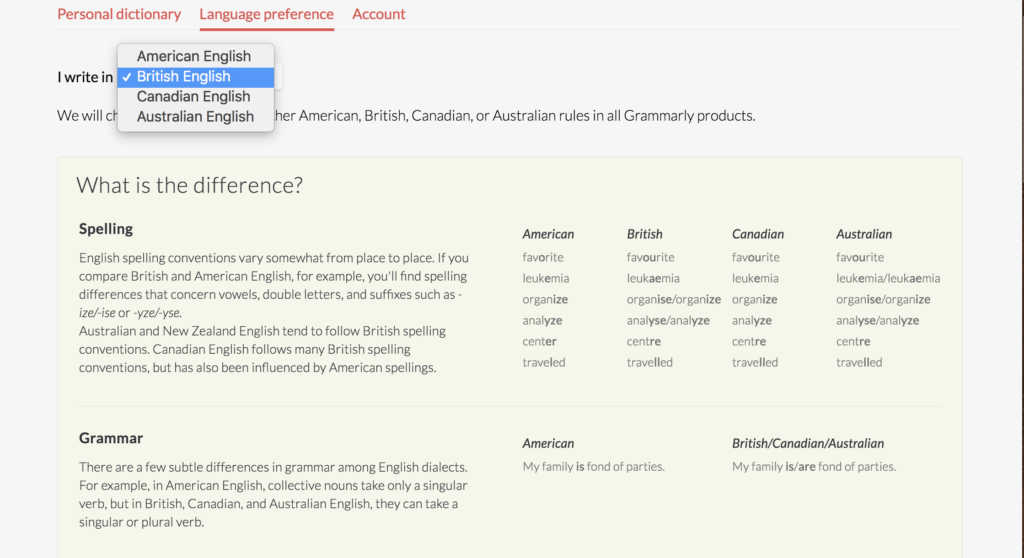Grammarly’s sleek video marketing campaign finally worked on me. As someone who has written every single day for the last ten years, I decided to see if Grammarly Premium lived up to the hype.
I admit I was a little hesitant to try Grammarly. I anticipated a steep learning curve for a basic spell checker (old MS Word style with that Paperclip dude) that would hinder me more than it would help. But with my volume of written work increasing at an incredible pace this year – academic essays, fiction and non-fiction books, business reports, articles – I figured it was about time I invested in improving my craft.
Despite studying English Language & Literature at the University of Oxford, grammar has never been my strong point. People often jokingly doubt I studied at Oxford when I make glaring grammatical mistakes. Even after teaching English as a second language for several years, my ability to explain grammar points that I understand on an intuitive level is embarrassingly poor.
I set out to explore Grammarly Premium with one essential question in mind:
Could Grammarly make me a better writer?
I knew the question would be difficult to answer in a quantifiable way. But I hoped that through experimenting with Grammarly using different forms of written communication, I could come to a relatively satisfactory ‘yes’ or ‘no’ answer with strong support to back it up.
I wanted to look at Grammarly Premium’s capacity to improve four types of writing:
- Academic writing
- Business writing
- Fiction writing
- Blog writing
For this Grammarly review, I used the following pieces of my writing as test subjects:
- My final-year Oxford University 6,000-word dissertation entitled ‘Conceptions of Individual and Universal Consciousness in the Writings of the Beat Generation’.
- Brochure copywriting for the logistics company I work at, plus a handful of internal company emails.
- A chapter from one of my published fiction books set in the Victorian era.
- My ‘How I Cured My Insomnia’ blog post.
Grammarly Premium Review
I’ll begin this Grammarly Premium review by looking at how it helps with specific facets of writing. As you’re probably most interested in investing in Grammarly for one particular kind of writing (maybe you’re a student, or perhaps you’re writing a novel), I’ll address those areas first.
Feel free to skip to the part that most interests you. After I’ve deep-dived into how Grammarly helps students, businesses, authors, and bloggers, I’ll give you my more general impressions of Grammarly.
Grammarly Premium for Academic Writing (Essays, Dissertations, Proposals)
I began my exploration of Grammarly Premium by running through one of my old dissertations from Oxford. Examiners gave this particular dissertation a high 2.1 grade (two marks off a first), so I thought it would be the perfect specimen to see just how much improvement Grammarly could offer.
Could Grammarly improve upon a decent dissertation from a world-class university?
It turns out it could!
Imagine my frustration that I can’t go back in time and implement the changes…
I did begin with doubts as Grammarly’s first suggested corrections were for quotes from writers like Allen Ginsberg and Jack Kerouac. How could you argue with those established writers?
Although I obviously wouldn’t be able to alter someone else’s words in a quotation, the fact remained that Grammarly’s suggestions did improve upon Ginsberg’s and Kerouac’s tautological writing styles.
Another strike against Grammarly came in the form of it making suggestions with which I vehemently disagreed. It would suggest more variety with my word choices when the words that I chose were specifically required.
For example, I couldn’t change the term ‘universal consciousness’ to ‘global consciousness’ because ‘universal consciousness’ actually has a technical meaning that was integral to the argument of the essay. In theory, I agreed with the rationale behind Grammarly’s suggestion but, because Grammarly didn’t know my essay’s argument, instead relying on an algorithm, it made a redundant suggestion.
So I wasn’t too sure of Grammarly’s helpfulness initially. But the further into the essay I got, the more I was convinced.
Grammarly started to throw stellar suggestion after stellar suggestion at me.
I noticed recurring patterns in my grammatical and lexical choices that weakened my writing, and Grammarly had the fix right there in front of me.
One example of something I continually fell back on was the passive voice, which made my writing (and therefore my argument) weaker. Passive voice is something I’ve battled hard to correct over the years, but it’s interesting to note that many instances of it still slipped past my awareness.
I poured so much time and effort into this dissertation back in the day. I reviewed it over and over again. My mentor, a PhD student about to become a tutor at Oxford, went over it with a fine-tooth comb. It went through countless edits…
And here I was many years later finding basic grammar and punctuation issues that would have elevated my final mark.
If only I’d had Grammarly back in my university days…
By the time I got to the end of my dissertation and reviewed all of Grammarly’s suggestions, I was thoroughly impressed.
Sure, not all of Grammarly’s suggestions hit the mark.
I found myself disagreeing with Grammarly on points of clarity and grammar just like I would disagree with another human who has proofread/copyedited my work.
But even though I didn’t take every suggestion on board (maybe 75% of the recommendations were excellent), I realised that Grammarly’s value is not merely in being a spell check.
Grammarly’s value is in bringing you a greater details-level awareness of our language.
I started to think more deeply about the language choices I made.
I might have argued with Grammarly and discarded a few suggestions, but at least I was aware of why I made a choice (e.g. stylistic, emphatic, or persuasive reasons).
In other instances, I was able to see linguistic crutches, like passive voice or ingrained bad habits like ineffectively using modifiers with adjectives, and draw up a plan of action to correct them.
Amending my weak points made my style stronger and my linguistic awareness tighter.
As someone who has never wanted to be a grammar nazi, Grammarly suddenly made me acutely aware of our different linguistic rules and gave me real pleasure in thinking about them.
Running through a proof became enjoyable as I sought to improve my writing style.
Grammarly gave me more than a bunch of great linguistic recommendations.
Grammarly gave me a newfound love of the English language.
- Check out Grammarly for free here.
Grammarly Premium for Business Writing (Emails and Business Copy)
For business copywriting, I found that Grammarly’s suggestions were even cleaner and there was a significant rate of appropriate recommendations.
A lot of it was pesky ‘dot the i’s and cross the t’s’ stuff with a heavy focus on punctuation and prepositional clauses.
There weren’t any massive mistakes that needed correcting, but I found Grammarly’s corrections extremely valuable in taking the copy to the highest level of quality.
The result was a piece of writing that demanded the comprehension level of a New York Times reader due to the specialised vocabulary but the grammar improvements made it smooth and elegant – just the tone we wanted!
As for emails, I don’t make too many mistakes personally because grammar and spelling mistakes turn me off when I read emails. But Grammarly was still able to catch a few errors caused by hasty writing and alerted me smoothly before I hit send.
Since adopting Grammarly, I’ve noticed the rate of poor grammar and spelling in many business emails is quite high.
If you’re in a typical brick-and-mortar B2B business, you probably know what I mean. You’ve probably seen mistakes in 70% of the emails you receive.
It’s pretty much the norm. People are busy. Most take it as a given now that email is closer to spoken communication than written.
But here’s my hunch:
Even if the person reading your email doesn’t consciously acknowledge it, proper grammar and spelling do make a huge difference.
When it’s consistent, and your entire company writes flawlessly, customers and partners will pick up on it very quickly.
You will give off an aura of professionalism, authority, and capability.
And with how easy and unobtrusive Grammarly is (seriously, the Chrome extension makes corrections a breeze), I don’t know why more businesses aren’t investing in this software.
- Check out Grammarly for free here.
Grammarly Premium for Fiction Writing (Novel)
Why do I do this to myself?
First I used Grammarly on a dissertation that I submitted years ago and is way too late to change.
Then I used it on a novel that’s already out in the world.
Call me a masochist.
To be fair though, the novel that’s already out can be changed, corrected, and updated (happens all the time) in the next run, so this exercise is not useless.
I really liked Grammarly when it came to reviewing fiction.
As you might expect, there were a lot of suggestions that I discarded because fiction writing, as a creative endeavour, involves a lot of subjective choices that I had concrete reasons for making.
But here’s the thing:
The suggestions I discarded were not bad suggestions.
Pretty much all of the suggestions were thoughtful and made me pause to reconsider my motivation for different choices.
The suggestions here made me feel like Grammarly was an intelligent being rather than a computer working through an algorithm.
There were many suggestions I took on board, and I believe they enhanced the quality of the prose.
Once again, the value Grammarly gave me when it came to fiction writing was not that of being ‘just a spellchecker’.
The value here is that I felt like I had a real knowledgeable person working alongside me, probing me, and making me more conscious of my word choices.
Thanks to Grammarly, my love of language deepened further.
The software even motivated me to write more so that I could continuously improve my craft.
- Check out Grammarly for free here.
Grammarly Premium for Blog Writing
Interestingly enough, Grammarly mainly caught spelling mistakes in my blog posts.
For most articles, I write in short sentences that most people can understand. I don’t try to be too ambitious with my grammar or turns of phrase. I also try to keep the style conversational.
I write most of my articles very quickly. Because I’m writing based on personal experience, I already know what I want to say. It’s just a matter of getting the words down.
But because I write fast, I do make a bunch of silly mistakes. I do review each article several times, but I still do not manage to catch all of the errors.
Grammarly, however, DOES catch all of the mistakes.
Depending on who you ask, a few mistakes here and there aren’t the end of the world.
But if you could catch them all easily and quickly, why wouldn’t you?
- Check out Grammarly for free here.
Grammarly Premium: Ease of Use
My fears that there would be a steep learning curve with Grammarly were dead wrong.
Grammarly is crazily easy to use.
All you need is Google Chrome to get started. From there, you can access this super neat Grammarly homepage that has all your documents and data stored.
You can also download an add-on that will integrate with your emails or anything else for which you need Grammarly.
If you can use Google and Word, you can use Grammarly.
For ease of use, Grammarly gets a 10/10.
When it comes to accessing the corrections and feedback, I love how streamlined and elegant everything is.
Everything you need is within easy reach. You can see the suggestions, the rationale (my favourite part), and quickly choose to implement or discard them with a simple click.
Grammarly Document Insights
Grammarly’s ‘Document Insights’ is one of my favourite features.
It’s features like this that have made me geek out over Grammarly.
With one click, you can see the readability score of your writing.
This is a wonderful tool for those who write for all different audiences.
I write YA fiction on the same day I write business emails, informational blog posts, and essays. As such, my writing tone or voice needs to change constantly. Sometimes I’ll forget that and end up writing something for a younger audience using a style I typically reserve for academia.
Grammarly’s insights help ensure consideration for your reader remains at the core of your communication.
I also love the ability to see reading and speaking time length. Very often I like to give an estimated reading time for stuff I write, and this is super helpful for that. I have also started outsourcing certain parts of my writing to be read aloud by professional speakers. This tool, once again, is handy for that.
Grammarly Goals
Here’s another nifty Grammarly feature:
You can set goals for the style of writing you’re using for your document.
You can effectively teach Grammarly what it should be on the lookout for as an editor by specifying your audience, intent, style, emotion, and domain.
This might explain why Grammarly had fewer corrections for my blog posts than my academic writing. I set one to have a casual style and general audience, while I set the other to have a formal style, academic domain, and expert audience.
Grammarly Personal Preferences
Grammarly’s also a fantastic tool for freelance writers who have to accommodate clients from different parts of the world.
Back when I was freelancing, I used to have to switch between British and American English a lot. You might think there’s not a huge difference, but it will surprise you how easy it is to get tripped up with this.
Grammarly helps in this area too because you can effortlessly toggle between different styles of English.
Grammarly Plagiarism Checker
It’s nice to have confirmation from Grammarly that I do not plagiarise my work. Plagiarism has never been a problem for me, but I do know a lot of students will construct their essays by rewording the work of others.
This is risky stuff and, even if you are making your own argument, if your wording comes too close to that of someone else’s, you can face some serious penalties from your institution (Oxford would immediately expel anyone caught plagiarising).
So, even though most people are honest and do not mean to plagiarise, it’s still a danger in this day and age that some inadvertent plagiarism might get through. For people worried about this, Grammarly’s plagiarism checker is worth its weight in gold.
Grammarly Premium Bottom Line: Is It Worth It?
You already know Grammarly has a free option. The free option is good and works well as a basic checker, but it doesn’t come close to the sophistication of Grammarly Premium.
Grammarly Premium is way more robust with far more advanced grammar, punctuation, spelling, and sentence context checks.
Grammarly Premium gives you the juicy in-depth grammatical explanations that will turn you into a grammar expert and elevate your appreciation for the English language.
Grammarly Premium is extensive and specific in a way that will improve your writing, not just check and correct it.
The lowest price for Grammarly Premium is $11.66/month for the annual plan, and I believe it is worth every penny on one condition:
You have a ton of writing to correct!
Most people wouldn’t baulk at spending the same amount on Netflix but, like me, they’ll have second thoughts about investing in a grammar checker that helps their day-to-day work and vocation.
Why?
I guess because streaming entertainment is sexy and grammar is not.
But Grammarly is actually pretty sexy. Try it out and you’ll see for yourself.
Grammarly is fun to use and will give you concrete results.
- If you’re a student, you’ll get better grades.
- If you’re a businessperson, you’ll appear more professional.
- If you write fiction, you’ll become more thoughtful about your creative linguistic choices.
Grammarly is totally worth it if you write a lot.
It’s not a magic bullet (nothing is), but it could be a game-changer for a lot of people.
Check out Grammarly here (for free) for yourself.
P.S. This post was proofread by Grammarly.
